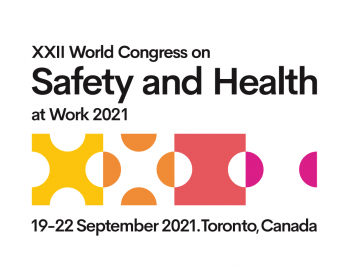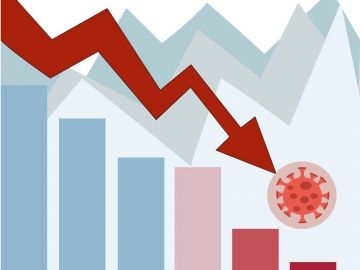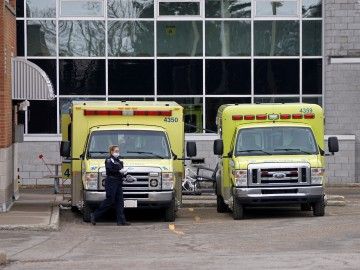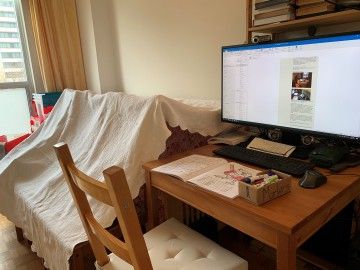What's new

5 Things We Think You Should Know
Every year, we pull together five of IWH's most practical research findings from the past year for professionals in occupational health and safety (OHS). The 2020 edition of 5 Things We Think You Should Know is now available. What five key health and safety findings did we choose for you this year?

How IWH research is adapting to reflect COVID-19 context
It will likely take time for researchers, workplace parties and policy-makers to understand the impact of the COVID-19 pandemic on the intersection between work and health. Here at the Institute, several ongoing studies are being adapted to reflect new pandemic realities.

Supporting settlement agencies to provide OHS information to newcomers
Newcomers to Canada face a higher risk of workplace injury and illness. That’s due in part to a lack of knowledge about their occupational health and safety (OHS) rights and responsibilities. Settlement agencies can help raise this awareness, but they also need support from the prevention system to do so. That’s according to a recent project involving IWH and several partner organizations.

Anxiety levels among health-care workers during COVID-19 linked to inadequate PPE
Nearly six in 10 surveyed health-care workers in Canada reported anxiety at levels surpassing an accepted threshold for clinical screening for the condition. Workers who reported more unmet PPE needs also reported higher levels of anxiety, according to a study by the Occupational Health Clinics for Ontario Workers (OHCOW), with analytical support from IWH.

IWH Updates - Spring 2020
Research associate joins scientist ranks ~ Dalla Lana alumni award goes to IWH scientist ~ CIHR scholarship awarded to IWH PhD student ~ World Congress 2020 rescheduled to 2021

XXII World Congress on Safety and Health at Work now taking place in September 2021
In light of public health guidance regarding COVID-19, the International Organizing Committee (IOC) of the XXII World Congress on Safety and Health at Work has made the difficult decision to postpone the event, which will now take place September 19 – 22, 2021. The good news is that the Congress will still take place at the Metro Toronto Convention Centre in the heart of downtown Toronto, Canada, exploring the Congress theme Prevention in the Connected Age: Global solutions to achieve safe and healthy work for all. The Congress is also being expanded to include virtual options, including live streaming to facilitate further global engagement.
Given the impact of COVID-19 on workplaces around the world, the IOC has also decided to convene a virtual meeting of global thought leaders focused on COVID-19 on October 5, 2020. More information about this meeting and how to participate will be posted to the Congress website in the coming weeks.

Accommodating episodic disabilities—a Lancaster House audio conference featuring Dr. Monique Gignac
What are the most common challenges in accommodating workers with episodic disabilities? How should key communication challenges be dealt with? What types of accommodations are generally helpful to workers with episodic disabilities? These are just some of the questions examined at a May 14 audio conference hosted by The Lancaster House, featuring Institute for Work & Health Scientific Co-Director and Senior Scientist Dr. Monique Gignac and several leading labour lawyers.

What research can do: How IWH research is responding to COVID-19
There is little debate that COVID-19 is dramatically affecting the work and health of people in Canada and around the world, in many different ways. Conducting research to understand the experiences of workers, and the effects of the pandemic on their physical and mental health, is essential. We at the Institute for Work & Health (IWH) have begun adjusting our research to address the impact of COVID-19 on different types of work and workers.

What has changed in the use of cannabis since legalization?
How much has changed in workers’ consumption patterns since recreational cannabis was legalized in October 2018? Early findings from an ongoing IWH study indicate use at work has stayed the same—with one in 12 workers reporting using cannabis at work, during work breaks or two hours before work.

Coronavirus: The risks to essential workers with hidden health conditions
The COVID-19 pandemic has left many in Canada’s workforce worried about their health and finances. Those worries are even greater for workers living with an underlying and invisible chronic health condition. In this op-ed, IWH Scientist Dr. Arif Jetha cautions that we can’t forget about workers who have invisible health conditions.

Take a moment to mark the Day of Mourning
Tuesday, April 28, is National Day of Mourning. The day is observed every year to commemorate workers who have been killed or injured on the job. This year, due to social distancing measures, many of the day's events are held online. Find listings from select organizations on our event page.

COVID-19 concerns greater for workers with health conditions
The COVID-19 pandemic has left many in Canada’s workforce worried about their health and finances. Those worries are even greater for workers living with an underlying and invisible chronic health condition. In the planning of health and safety responses to COVID-19 and the ultimate reopening of workplaces, employers should be aware of the unique needs of this potentially vulnerable group of workers, writes IWH Scientist Dr. Arif Jetha in The Conversation.

Setting up a temporary home office in a time of social distancing
Working at home in the middle of a COVID-19 pandemic means having no time and little opportunity to set up ergonomically sound workstations. So what can office workers do to make their kitchen table workspaces as comfortable as possible? We turn to Dr. Dwayne Van Eerd, who co-led the development of eOfficeErgo, for advice.

Poorer post-injury experiences lead to worse RTW outcomes for psychological claimants
Workers’ compensation claimants with work-related psychological injuries report poorer experiences and interactions throughout the return-to-work (RTW) process. According to an IWH study conducted in Australia, these experiences are interconnected, leading to longer time off from work.

IWH and COVID-19: Message from the President, Dr. Cam Mustard
At the Institute for Work & Health (IWH), we have implemented a number of workplace social distancing measures. Most of us are working remotely. We have cancelled events scheduled to take place in the near term. We are conducting all meetings virtually.
We know we are in the fortunate position of being able to work remotely. To the health-care workers, emergency service providers, airline and transit personnel, retail employees and others on the front lines, we thank you wholeheartedly for your important work.
You will continue to hear from us through our newsletters, website and social media channels. In the meantime, we wish you the best in these difficult times. Stay safe and be well.
Dr. Cameron Mustard
President, Institute for Work & Health

Access to mental health services among workers with physical injuries
Among workers with a compensation claim for a work-related musculoskeletal injury, 30 per cent also experience a serious mental condition. However, a minority of these workers receive treatment for their mental health conditions, according to an Institute for Work & Health study conducted in Australia.

IWH postpones upcoming forum on newcomers and safety
Due to circumstances related to COVID-19, the Institute is postponing the Safe Work Integration of Newcomers Forum, originally scheduled to take place March 30. We will announce a new date as soon as we know. We continue to monitor updates from public health officials regarding other events due to take place in the spring. They include the annual Systematic Review Workshop, scheduled for mid-May, as well as future IWH Speaker Series presentations.

Dr. Basak Yanar joins rank of IWH scientists
Congratulations to Dr. Basak Yanar, who was recently promoted from research associate to associate scientist at the Institute. Yanar has been leading research on the working conditions of newcomers to Canada. One of her current projects examines the role of employers, settlement service providers and the occupational health and safety (OHS) prevention system in promoting safe work among new immigrants.

IWH Updates - Winter 2020
Lewis Gottheil retires from IWH board ~ Announcing IWH’s new KTE manager ~ Register for IWH systematic review workshop ~ IWH 2020/21 Activity Plan now available

Can an eight-item questionnaire pick up on real-world differences in OHS practice?
How well can a set of eight questions capture something as broad and multi-faceted as an organization’s occupational health and safety (OHS) policies and practices? An Institute for Work & Health (IWH) team conducted interviews and worksite visits at organizations that had completed the eight-item leading indicator tool, called the IWH-Organizational Performance Metric. It found consistent patterns in how high- and medium-scorers approach OHS.

IWH Speaker Series: Cannabis at work pre- and post-legalization
Now that the non-medical use of cannabis is legal, how much has changed in workers’ use of, and attitudes about, cannabis at work? Find out at an IWH Speaker Series presentation on March 3, when IWH Associate Scientist Dr. Nancy Carnide shares early results from her surveys of workers pre- and post-legalization.

What research can do: IWH newcomer training resource sees uptake by various groups in Canada
The Institute for Work & Health (IWH)’s Safe Work Toolkit, published in December 2019, is designed to help settlement agencies provide occupational health and safety training to their newcomer clients. This toolkit is an update of Prevention is the Best Medicine, first created in 2011. Since its release in 2011, the toolkit has been used by different types of stakeholders, in Ontario and beyond.

What helps workers with MSDs, pain or mental health conditions return to work?
What workplace-based interventions are effective in helping workers with musculoskeletal disorders, pain and/or mental health conditions return to work (RTW)? What does the research literature say about the effectiveness of case management, work hardening, physician training and other practices on RTW outcomes? Our new Sharing Best Evidence summarizes findings of a systematic review.

Using coroner data to examine role of cannabis in workplace deaths among recently funded IWH projects
Exploring the use of coroner data to understand the impact of cannabis on work-related deaths, anticipating future labour-market challenges facing young people with disabilities, tracking long-term outcomes for workers’ compensation claimants: these are just some of the new projects under way at IWH, thanks to external grants awarded over the past year.

IWH Speaker Series presentation: Introducing a new CSA standard on work disability management systems
On February 4, CRWDP director and IWH Senior Scientist Dr. Emile Tompa introduces a new standard created by the CSA Group, in conjunction with the Centre for Research on Work Disability Policy (CRWDP) and Conestoga College. At the IWH Speaker Series presentation, Tompa discusses how the Work Disability Management Systems Standard (CSA Z1011) sets out best practices on injury/illness rehabilitation, return-to-work plans, and accommodation of workers with disabilities.

Pan-Canadian strategy on disability and work unveiled at conference
After two years of extensive consultation with a host of stakeholders, the pan-Canadian strategy on greater inclusion of people with disabilities in the labour market is now out. The strategy was unveiled in December at the 2019 Disability and Work in Canada Conference, where participants looked ahead for opportunities to make progress with concrete, achievable initiatives.

Building capacity in the settlement service sector to promote OHS awareness among newcomers
Newcomers to Canada are at increased risk of workplace injury and illness, due in part to a lack of knowledge about their rights and responsibilities in occupational health and safety (OHS). IWH was recently involved in a project focused on supporting settlement agencies to promote OHS awareness among newcomers. In an upcoming IWH Speaker Series presentation, IWH's Dr. Basak Yanar joins Eduardo Huesca of Occupational Health Clinics for Ontario Workers (OHCOW) to talk about OHS capacity-building workshops for settlement agencies. They also discuss opportunities for Ontario’s OHS system partners to further support the settlement sector.

Comparing employment patterns of older workers in four countries
In many developed countries, including Canada, encouraging older workers to stay in the workforce is a common policy goal. But what do we know about current work participation patterns among people aged 65 to 75? A new study involving IWH looks at data in Canada, the United Kingdom, Denmark and Sweden.

Season's Greetings from all of us at IWH
The holidays are upon us. We at the Institute for Work & Health (IWH) wish you all the best of the season. May your holidays be restful, joyful and safe. Thank you for your support in 2019. Let’s resolve to continue working towards greater worker protection in the new year.

Claimants’ perceptions of fair treatment linked to lower odds of mental illness
Previous studies have suggested that the process of making a workers’ compensation claim is linked with poorer mental health. A new study by IWH examines the contribution of one aspect of the process: the interactions between injured workers and case managers. As summed up in At Work, the findings of this study drive home the importance of treating claimants respectfully and giving them the information they need.